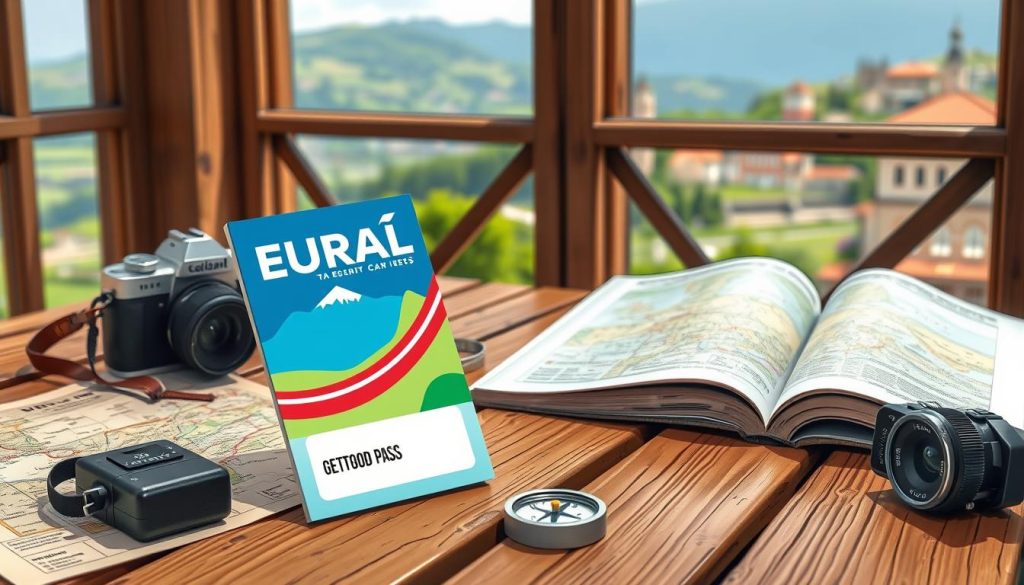This guide is all about getting the best out of Europe on a budget. It’s perfect for students or anyone wanting to travel without spending a lot. You’ll learn how to travel cheaply in Europe and still have a great time. We’ll cover everything from understanding local cultures and currencies to finding affordable places to stay and travel.
By following our tips, you can travel Europe without spending too much. You’ll be able to make unforgettable memories while sticking to your budget. So, get ready to start your European adventure and make it a trip to remember.
Key Takeaways
- Leverage budget-friendly transportation options like Eurail passes and budget airlines to save on travel costs12
- Explore alternative accommodation options such as Airbnb, hostels, and camping to reduce lodging expenses13
- Embrace local cuisine by visiting supermarkets, bakeries, and budget-friendly cafes to save on food costs3
- Utilize credit card rewards and points to offset the cost of flights and other expenses3
- Remain flexible in your travel plans to take advantage of last-minute deals and spontaneous opportunities2
Adjusting to Different Cultures and Currencies
Traveling to Europe means quickly getting used to new cultures and currencies. A big mistake is not knowing exchange rates, which can lead to high charges on credit card purchases4. To avoid this, research exchange rates online before you go and look for places that offer “No Commission” for the best rates4.
Understanding Exchange Rates and Avoiding Costly Mistakes
Exchanging money often can be a hassle and expensive5. Using credit cards with low fees for international use can save you money compared to exchanging cash all the time5. Many credit card companies offer special travel benefits, like no foreign transaction fees and good exchange rates6.
Using Credit Cards for Fair Conversion Rates
Credit cards are widely accepted in Europe, making them a handy way to pay5. Using credit cards for most of your purchases can help you save money by avoiding high exchange costs6. By picking credit cards with low international interest rates, you get fair exchange rates across Europe4.
Adjusting to different cultures and currencies is key to budget-friendly travel in Europe4. Knowing about exchange rates, finding fair conversion options, and using credit cards with low fees can help you avoid high costs and make the most of your trip5. With smart planning, you can enjoy Europe’s rich cultural experiences without breaking the bank6.
Investing in a Eurail Pass for Affordable Transportation
Planning a budget-friendly trip to Europe? The Eurail pass is a great choice. It helps save money by covering a big part of your travel costs7. Even though it costs a bit upfront, it lets you visit many places quickly and easily8.
Benefits of the Eurail Pass for Extensive Travel
The Eurail pass makes traveling between thousands of towns and cities easy8. With the Eurail app, planning your trip and finding your way is simple. This means you save money and enjoy the journey more.
Limitations and Additional Costs of the Eurail Pass
The Eurail pass is great for budget travel, but it’s not perfect. If you’re just visiting big cities in Western Europe, it might not save you money. You’ll need to pay extra for seat reservations in some places9. Also, sometimes, point-to-point tickets are cheaper than the Eurail pass9.
It’s key to look into the Eurail pass and compare it with other travel options. This way, you make sure it fits your travel plans and budget.

Eating on a Budget: Supermarkets, Bakeries, and Local Cafes
Eating on a budget in Europe is totally doable. Avoiding tourist spots and choosing supermarkets, bakeries, and local cafes can cut down food costs10. European supermarkets have great in-house bakeries with fresh, tasty, and cheap baked goods like croissants and quiches10. Just a few blocks away from tourist areas, you can find hidden cafes that locals love, offering real and affordable food11. These local spots are where travelers in Europe go to avoid tourist traps and find genuine and budget-friendly food11. By choosing these options, you can enjoy local food without breaking the bank.
Supermarkets and their bakeries are key to eating cheap in Europe10. Most grocery stores close by 8:00 pm and are closed on Sundays, but small convenience stores are open late but charge more10. These bakeries have a wide range of fresh baked goods, from flaky croissants to big loaves of bread, all cheaper than cafes and restaurants10. You can get prepared sandwiches, wraps, and salads for $5-$9, and special deals with dessert or fruit and drink for $8-$1210.
Local cafes and eateries also offer great and affordable food11. Buying food at local markets for a picnic lunch is a smart choice for those watching their budget, offering fresh and cheap options11. A doner kebab, a cheap meal in Europe, costs about $4-$6 and comes with thinly sliced meat in pita bread with toppings and fries10. Sharing street food like kebabs can be around $6 per person for two people10.
By choosing budget-friendly food options, travelers can dive into the local food culture without spending a lot. Whether it’s buying fresh baked goods at supermarkets or finding hidden cafes, the secret to eating well on a budget in Europe is to look beyond tourist spots and try local places.
| Budget Food Option | Average Cost |
|---|---|
| Prepared supermarket sandwiches, wraps, and salads | $5-$9 |
| Supermarket meal deal (main, dessert/fruit, and drink) | $8-$12 |
| Doner kebab | $4-$6 |
| Shared street food (e.g., kebabs) | $6 per person |
“Eating outside at sidewalk cafes in Europe may come at a premium due to the experience and ambiance.”10
By using these budget-friendly food options, travelers can enjoy Europe’s flavors without spending too much. From supermarket bakeries to local cafes, there are many chances to eat well and affordably across the continent.
how to travel on a budget in Europe: Affordable Accommodation Options
Exploring Europe on a budget can be tough, especially when it comes to finding a place to stay. But, there are ways to save money and still have a comfy stay. Airbnb is a great choice, offering private rooms or whole apartments for less than hotels12. The authors found Airbnb spots for as little as $35 a night, giving them a comfy and private place to stay instead of hostels.
https://tunekong.com/hardscaping-ideas-that-will-make-your-backyard-the-talk-of-the-neighborhood-25/
Utilizing Airbnb for Budget-Friendly Stays
Airbnb is a smart pick for saving on where you stay12. You can often find prices way lower than hotels or resorts, saving up to $119 a night12. Plus, sharing an Airbnb with a friend can cut costs even more, making it just $43 a night for each person12.
Camping, Hostels, and Alternative Sleeping Arrangements
There are more ways to save on where you stay, like camping, hostels, and other unique places12. The authors spent 36 nights wild camping, 7 in campgrounds, and 10 in hostels during their three-month trip12. These choices might not be as comfy as a hotel, but they offer a fun and adventurous way to save money. You can spend that saved cash on things you really want to do.
| Accommodation Type | Total Nights | Cost Savings |
|---|---|---|
| Wild Camping | 36 nights | Significant savings compared to hotels or hostels |
| Campgrounds | 7 nights | Affordable alternative to hotels |
| Hostels | 10 nights | Budget-friendly option for solo travelers or small groups |
| Airbnb | Varies | Can provide cost savings of up to $119 per night compared to traditional hotels12 |
Being open to adventure and flexible with where you stay can help you travel Europe on a budget. This way, you can spend your money on what really matters to you.

“Embracing a spirit of adventure and flexibility when it comes to accommodation is key to traveling Europe on a tight budget.”
Conclusion: Embracing the Budget Travel Mindset
Embracing the budget travel mindset opens up a world of possibilities in Europe. By adjusting to different cultures and currencies, you can use favorable exchange rates13 and avoid costly mistakes. This ensures your money stretches further14.
Buying a Eurail pass gives you affordable and flexible travel options. It lets you easily move around the continent14. Also, eating at local supermarkets, bakeries, and cafes can introduce you to authentic tastes at low cost13.
Choosing budget-friendly places to stay, like Airbnb, hostels, or camping14, helps you save money. This leaves more room in your budget for fun and new discoveries. With the right mindset and a willingness to explore, your trip can be both enjoyable and budget-friendly1314.
FAQ
How can I adjust to different cultures and currencies when traveling on a budget in Europe?
Start by researching exchange rates online before you go. This helps you get the best rates. Also, skip exchanging money at airports or train stations for better deals. Using credit cards with low international interest rates can also save you money across Europe.
How can the Eurail pass benefit my budget-friendly travels in Europe?
The Eurail pass gives you access to Europe’s rail network. This lets you see many places quickly. With the Eurail app, planning your trips is easy. It saves you money and time.
What are some limitations of the Eurail pass that I should be aware of?
The Eurail pass might not always be the cheapest option for specific routes. If you’re just visiting big cities in Western Europe, it could be more expensive. You’ll need to pay extra for seat reservations in some places.
How can I eat on a budget in Europe?
Stay away from restaurants in tourist areas and try local spots instead. Supermarkets, bakeries, and cafes offer tasty, affordable food. European supermarkets have great in-house bakeries with fresh goods.
What are some affordable accommodation options for traveling on a budget in Europe?
Consider Airbnb for private rooms or apartments that are cheaper than hotels. Camping, hostels, and other alternatives can also cut down your costs.
How can I embrace the budget travel mindset when visiting Europe?
Adapt to local cultures and currencies, use the Eurail pass for cheap travel, and pick affordable food and places to stay. Embrace adventure to see Europe without spending a lot.
[aiovg_video type=”youtube” youtube=”https://www.youtube.com/watch?v=tciYjlFc0Fs” autoplay=”1″]

